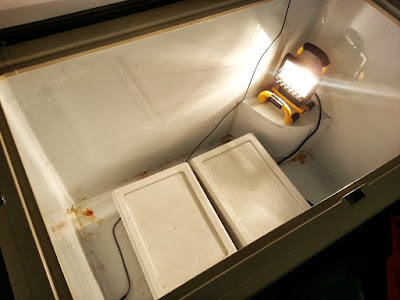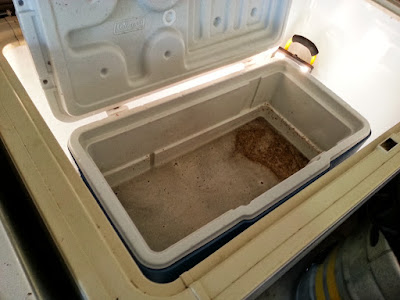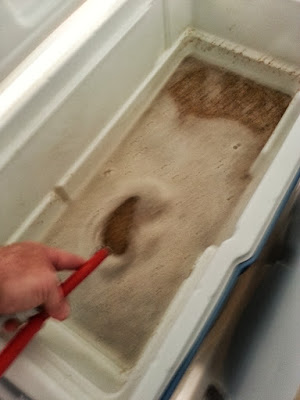- Recipe Type
- All Grain
- Yeast
- see instructions
- Yeast Starter
- see instructions
- Batch Size (Gallons)
- 10
- Original Gravity
- 1.030
- Final Gravity
- 1.000
- Boiling Time (Minutes)
- 1
- IBU
- 4
- Color
- pale straw
- Primary Fermentation (# of Days & Temp)
- 28 @78
- Secondary Fermentation (# of Days & Temp)
- 28 @72
- Tasting Notes
- light, crisp, extremely refreshing, this is my brew day beer of choice
Clocking in at around 2% ABV you won't get too  on this one. My berliner has definitely become my favorite all around summer quaffer. The best part is, it is VERY cheap and easy to crank out a batch.
on this one. My berliner has definitely become my favorite all around summer quaffer. The best part is, it is VERY cheap and easy to crank out a batch.
I have entered this beer into four competitions so far. It has one second place, first place, first place, and best of show (pro AM comp). You don't need to take MY word for it it's a good beer!
6.5# Pils
4.25# White Wheat Malt
1oz Hallertau whole leaf hops (added to mash)
Five days before brew day, prepare two 1L starters:
- 1.040 all wort starter on stir plate with White Labs Brettanomyces Clausenii
- Unstirred starter with White Labs Lactobacillus Delbrueckii
The bacteria starter consists of 10g of powdered milk, 10g of bread yeast boiled in water the microwave to kill it, 20g of corn sugar, and 10g of DME. Keep it as warm as possible -- 78*F or warmer is ideal.
Mash grains for 90 minutes at 149*F. If your mash tun is large enough, add all of the water to the mash tun before running off -- 11.5 gallons total water to yield 10 gallons. Otherwise you can do a single batch sparge. I do not recommend fly sparging since you can overextract too easily. Don't vorlauf -- you want cloudy wort.
Run wort off to the kettle, heat to 180*F, and hold uncovered for 10 minutes to pasteurize before chilling. Chill to around 90*F, and run half of the wort off to one fermenter that will get the bacteria. Pitch the bacteria without aerating, cover the fermenter with a blanket to keep it warm, and put it in a warm place. My garage is about a perfect 78-82*F in the spring which is when I brew mine. Chill the remaining wort to 72*F, run off to a second fermenter, aerate, and pitch the brett starter into it. I keep mine in the garage next to the lacto fermenter without a blanket since the warm temps won't hurt the brett.
After 28 days, combine the two batches into another fermenter (I use two kegs racking half from each fermenter) and let it sit at room temp around 72*F for another month. Then rack to serving kegs, force carbonate, and enjoy. I force carbonate to 3.5 volumes CO2.
I like my berliner pretty tart, so I add 1 Tablespoon of 88% lactic acid to each keg for a little extra kick. Don't go overboard on the lactic, or it will taste artificial.
If you try to bottle condition this beer I'd carbonate it pretty well, 5.5oz per 5 gallons of corn sugar to prime, and add champagne yeast. Brett tend not to do very well bottle conditioning on their own.
 on this one. My berliner has definitely become my favorite all around summer quaffer. The best part is, it is VERY cheap and easy to crank out a batch.
on this one. My berliner has definitely become my favorite all around summer quaffer. The best part is, it is VERY cheap and easy to crank out a batch.I have entered this beer into four competitions so far. It has one second place, first place, first place, and best of show (pro AM comp). You don't need to take MY word for it it's a good beer!
6.5# Pils
4.25# White Wheat Malt
1oz Hallertau whole leaf hops (added to mash)
Five days before brew day, prepare two 1L starters:
- 1.040 all wort starter on stir plate with White Labs Brettanomyces Clausenii
- Unstirred starter with White Labs Lactobacillus Delbrueckii
The bacteria starter consists of 10g of powdered milk, 10g of bread yeast boiled in water the microwave to kill it, 20g of corn sugar, and 10g of DME. Keep it as warm as possible -- 78*F or warmer is ideal.
Mash grains for 90 minutes at 149*F. If your mash tun is large enough, add all of the water to the mash tun before running off -- 11.5 gallons total water to yield 10 gallons. Otherwise you can do a single batch sparge. I do not recommend fly sparging since you can overextract too easily. Don't vorlauf -- you want cloudy wort.
Run wort off to the kettle, heat to 180*F, and hold uncovered for 10 minutes to pasteurize before chilling. Chill to around 90*F, and run half of the wort off to one fermenter that will get the bacteria. Pitch the bacteria without aerating, cover the fermenter with a blanket to keep it warm, and put it in a warm place. My garage is about a perfect 78-82*F in the spring which is when I brew mine. Chill the remaining wort to 72*F, run off to a second fermenter, aerate, and pitch the brett starter into it. I keep mine in the garage next to the lacto fermenter without a blanket since the warm temps won't hurt the brett.
After 28 days, combine the two batches into another fermenter (I use two kegs racking half from each fermenter) and let it sit at room temp around 72*F for another month. Then rack to serving kegs, force carbonate, and enjoy. I force carbonate to 3.5 volumes CO2.
I like my berliner pretty tart, so I add 1 Tablespoon of 88% lactic acid to each keg for a little extra kick. Don't go overboard on the lactic, or it will taste artificial.
If you try to bottle condition this beer I'd carbonate it pretty well, 5.5oz per 5 gallons of corn sugar to prime, and add champagne yeast. Brett tend not to do very well bottle conditioning on their own.






